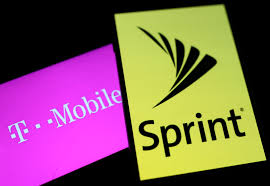Sprint Had Merger Talks With 3 Other Companies Before Agreeing to T-Mobile Deal

A new securities filing for the T-Mobile-Sprint merger makes clear what had been only rumored over the past year: Sprint was a hot commodity—kind of.
In addition to its on-again/off-again talks with T-Mobile, which ultimately resulted in a $ 27 billion deal in April, Sprint also held fairly serious talks with at least three other companies. The filing with the Securities and Exchange Commission dated July 30 doesn’t name the three, labeling them only Company A, B, and C. Analysts say they are, respectively, cable giants Charter Communications and Comcast along with satellite TV service Dish Network. But it doesn’t appear as though any of those talks got serious enough to present a real alternative to T-Mobile’s offer.
Sprint (s) and T-Mobile (tmus) declined to comment on the filing. Comcast (cmcsa) and Dish (dish) did not immediately respond to a request for comment. In a call with analysts on Tuesday, Charter (chtr) CEO Tom Rutledge appeared to deny talking with Sprint about a merger.
But according to the filing, talks between Sprint, its majority-owner SoftBank Group, and Charter and its biggest shareholder, John Malone, seem to have gotten serious in June 2017. That’s when the two companies signed a nondisclosure agreement to allow the exchanging of financial information. The agreement also covered another public company, which analysts peg as Comcast, since Charter and Comcast had been cooperating somewhat on rolling out their own wireless services. The Wall Street Journal reported on the agreement at the time, as well. A separate nondisclosure agreement covering Sprint and Malone appears to have been signed in July, according to the filing.
By late July, talks had heated up. Sprint, SoftBank, Charter and Malone met in late July to “discuss a possible business combination between Sprint and Company A,” the filing says.
That seems to be at odds with comments by Charter CEO Tom Rutledge on Tuesday, after the filing was made public. Rutledge said Charter “didn’t make an attempt to buy any wireless assets” and only held talks about entering an agreement to buy wireless service from Sprint as a wholesaler, like it was already doing with Verizon.
The New York Post had reported last November that Rutledge and Malone argued over merger strategy. Malone wanted to sell Charter to Sprint majority owner SoftBank while Rutledge wanted to buy more, smaller cable TV companies, the paper reported.
And some Sprint meetings over the summer of 2017 described in the filing included only Malone or his financial advisor, not Charter itself. By late September, after a final meeting between representatives for Charter and Sprint, no agreement was reached and the talks ended.
That led to a more detailed meeting between Sprint and T-Mobile on Sept. 26 where specific details were discussed of how a merger might be completed, including the exchange ratio between the two companies’ stocks. But those talks, too, broke down when the two sides couldn’t agree on an exchange ratio or a governance structure that pleased both sides. On Nov. 4, they issued a joint statement that talks were off.
And that’s when Dish Network, as “Company C,” appears to have stepped in. The companies entered into a nondisclosure agreement in Dec. 2017 and continued talking through Feb. 2018.
But on Feb. 23, T-Mobile and Sprint met in person and got very specific about possible exchange ratios. T-Mobile and its majority owner Deutsche Telekom said they would merge valuing each T-Mobile share at 10.5 Sprint shares. Sprint and SoftBank sought a ratio of 9 to 1.
Two days later Sprint and Dish held their last, unsuccessful meeting, leading to a series of intensifying talks between T-Mobile and Sprint that eventually led to the April 29 public merger announcement.
One key turning point appears to have been a March 27 meeting when the two sides agreed to an exchange ratio valuing each share of T-Mobile at 9.75 shares of Sprint. SoftBank even agreed to allow its shareholder voting power to be dictated by Deutsche Telekom, a necessary requirement for DT so that it could continue to include the U.S. wireless unit’s financial results consolidated with its own. And they agreed that T-Mobile CEO John Legere would become CEO of the merged company.
Another motivating event to help the deal finally close occurred at an April 8 board meeting at Sprint. In addition to getting an update on how talks were progressing with T-Mobile, the board also got “an adjusted set of financial forecasts” for Sprint that took into account “certain Sprint-specific and overall industry challenges.”
The two sides then quickly hashed out a complete merger agreement over the next few weeks and announced their transaction on April 29. It’s now before regulators at the Justice Department and Federal Communications Commission.
The filing also included a bit of pro forma financial information looking at how the combined companies would have performed last year if they had already merged. Revenue would have totaled $ 72.7 billion with net income of $ 12.5 billion, or $ 9.63 per share.



